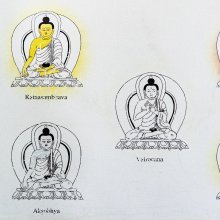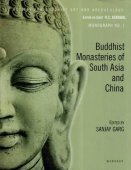Zen, Chan, Chaṇ: 6 definitions
Introduction:
Zen means something in Buddhism, Pali, Hinduism, Sanskrit, the history of ancient India, biology. If you want to know the exact meaning, history, etymology or English translation of this term then check out the descriptions on this page. Add your comment or reference to a book if you want to contribute to this summary article.
Alternative spellings of this word include Chhan.
Images (photo gallery)
(+1 more images available)
In Hinduism
Vyakarana (Sanskrit grammar)
Source: Wikisource: A dictionary of Sanskrit grammarChaṇ (छण्).—tad. affix ईय (īya) causing the vrddhi substitute for the first vowel of the word to which it is added. छण् (chaṇ) is added (1) to the words पितृत्वसृ (pitṛtvasṛ) and मातृप्वसृ (mātṛpvasṛ) in the sense of अपत्य (apatya); cf. P IV. 1.132, 134; (2) to the words कृशाश्व,अरिष्ट (kṛśāśva, ariṣṭa) and others as a चातुरर्थिक (cāturarthika) affix: cf. P. IV. 2.80; (3) to the words तित्तिरि, वरतन्तु, खण्डिक (tittiri, varatantu, khaṇḍika) and उख (ukha) in the sense of 'instructed by', cf. P.IV.3.102; and (4) to the word शलातुर (śalātura) in the sense of 'being a national of' or 'having as a domicile.' e. g. शालातुरीयः (śālāturīyaḥ) cf. P. IV. 3.94,

Vyakarana (व्याकरण, vyākaraṇa) refers to Sanskrit grammar and represents one of the six additional sciences (vedanga) to be studied along with the Vedas. Vyakarana concerns itself with the rules of Sanskrit grammar and linguistic analysis in order to establish the correct context of words and sentences.
In Buddhism
General definition (in Buddhism)
Source: Buddhist Door: Glossaryalso called Chan; see Contemplation and Meditation.Source: WikiPedia: BuddhismZen is a school of Mahayana Buddhism, referred to in Chinese as Chan. Chan is itself derived from the Sanskrit Dhyana, which means "meditation".
Zen emphasizes experiential wisdom and mdash;particularly as realized in the form of meditation known as zazen and mdash;in the attainment of awakening, often simply called the path of enlightenment. As such, it de emphasizes both theoretical knowledge and the study of religious texts in favor of direct, experiential realization through meditation and dharma practice.
Within Zen, there are various legends and mythologies, largely a part of Chinese and Japanese folklore, which must be carefully distinguished from Zen history.
Source: Shambala Publications: GeneralZen Jap., an abbreviation of the word zenna (also zenno), the Japanese way of reading Chinese ch’an-na (short form, ch’an). This in turn is the Chinese version of the Sanskrit word dhyāna, which refers to collectedness of mind or meditative absorption in which all dualistic distinctions like I/you, subject/object, and true/ false are eliminated. Zen can be defined both exoterically and esoterically.
Exoterically regarded, Zen, or Ch’an as it is called when referring to its history in China, is a school of Mahāyāna Buddhism that developed in China in the 6th and 7th centuries from the meeting of Dhyāna Buddhism, which was brought to China by Bodhidharma, and Taoism. In this sense Zen is a religion, the teachings and practices of which are directed toward self-realization and lead finally to complete awakening as experienced by Shākyamuni Buddha after intensive meditative self-discipline under the Bodhi-tree. More than any other school, Zen stresses the prime importance of the enlightenment experience and the uselessness of ritual religious practices and intellectual analysis of doctrine for the attainment of liberation. Zen teaches the practice of zazen, sitting in meditative absorption as the shortest, but also the steepest, way to awakening.
The essential nature of Zen can be summarized in four short statements:
- “[a] special transmission outside the [orthodox] teaching”;
- nondependence on [sacred] writings”; and
- “direct pointing [to the] human heart”; leading to
- realization of [one’s own] nature [and] becoming a buddha.”
This pregnant characterization of Zen is attributed by tradition to Bodhidharma, its first patriarch; however, many modern scholars suspect that it originated rather with the later Ch’an master Nan-ch’uan P’u-yuan (Jap., Nansen Fugan).
India history and geography
Source: Shodhganga: Vernacular architecture of Assam with special reference to Brahmaputra Valley1) Chan is a Tai Khamyang term referring to “front open area of house”.—It appears in the study dealing with the vernacular architecture (local building construction) of Assam whose rich tradition is backed by the numerous communities and traditional cultures.
2) Chan is also a Tai Phake term referring to “scullery”.

The history of India traces the identification of countries, villages, towns and other regions of India, as well as mythology, zoology, royal dynasties, rulers, tribes, local festivities and traditions and regional languages. Ancient India enjoyed religious freedom and encourages the path of Dharma, a concept common to Buddhism, Hinduism, and Jainism.
Biology (plants and animals)
Source: Google Books: CRC World Dictionary (Regional names)1) Chan in India is the name of a plant defined with Bauhinia tomentosa in various botanical sources. This page contains potential references in Ayurveda, modern medicine, and other folk traditions or local practices It has the synonym Alvesia bauhinioides Welw. (among others).
2) Chan is also identified with Jasminum grandiflorum It has the synonym Jasminum floribundum R. Br. ex Fresen. (etc.).
3) Chan is also identified with Oryza sativa It has the synonym Oryza plena (Prain) Chowdhury (etc.).
4) Chan in Pakistan is also identified with Persea odoratissima It has the synonym Machilus odoratissimus (Wall. ex Nees) Nees (etc.).
Example references for further research on medicinal uses or toxicity (see latin names for full list):
· Indian Journal of Genetics and Plant Breeding (1965)
· Proceedings of the Indian Science Congress Association (1987)
· Chin. J. Rice Sci. (1996)
· Physis. Revista de la Sociedad Argentina de Ciencias Naturales (1933)
· Plantae Asiaticae Rariores (1831)
· Apontamentos Phytogeographicos (1858)
If you are looking for specific details regarding Chan, for example extract dosage, pregnancy safety, health benefits, side effects, chemical composition, diet and recipes, have a look at these references.

This sections includes definitions from the five kingdoms of living things: Animals, Plants, Fungi, Protists and Monera. It will include both the official binomial nomenclature (scientific names usually in Latin) as well as regional spellings and variants.
See also (Relevant definitions)
Starts with: Zende, Zende balada hullu, Zendu, Zenduk, Zeng-jil, Zengeza, Zenina, Zenjabil, Zenkey su nya, Zenya, Zenzue.
Ends with: Aizen, Buar-zen, Citizen, Fuke Zen, Ichinen Sanzen, Kezen, Kizzen, Maudzen, Oka azen, Rozen, Sezen, Tlitliltzen, Zazen.
Full-text (+113): Bodhidharma, Ishakhana, Murchakhana, Khanakhana, Hui Neng, Mushakhana, Mirakhana, Buar-zen, Adamakhana, Ladakhana, Sadakhana, Chan tan, Huang chan, Saristhakha, Tenich-chan-kaya, Chang-chan, Hajyakhana, Saradiya, Krawaan chan, Aug chan.
Relevant text
Search found 62 books and stories containing Zen, Chan, Chaṇ, Chaṅ; (plurals include: Zens, Chans, Chaṇs, Chaṅs). You can also click to the full overview containing English textual excerpts. Below are direct links for the most relevant articles:
Zen Buddhism – Japan (The Direct Method to < [July – September, 1994]
Thoreau and Zen Buddhism < [October – December, 2001]
The Oriental element in Henry Miller < [January – March, 1990]
Buddha-nature (as Depicted in the Lankavatara-sutra) (by Nguyen Dac Sy)
2.1. The Thought of Buddha-nature in Chan < [Chapter 6 - Further Development of the Thought of Buddha-nature in China]
2.2. Chan and the Laṅkāvatāra-sūtra < [Chapter 6 - Further Development of the Thought of Buddha-nature in China]
2.3. The Buddha-nature in Gongan and Mozhao Chan < [Chapter 6 - Further Development of the Thought of Buddha-nature in China]
Buddhacarita (by Charles Willemen)
Maha Prajnaparamita Sastra (by Gelongma Karma Migme Chödrön)
Notes on the renouncement of intoxicating drinks < [Section I.5 - Abstention from liquor]
Act 10.9: The transformed Sahā universe compared with the Padmāvatī universe < [Chapter XV - The Arrival of the Bodhisattvas of the Ten Directions]
Act 10.7: The universes and Buddhas of the ten directions < [Chapter XV - The Arrival of the Bodhisattvas of the Ten Directions]
The Bhikkhus Rules (by Bhikkhu Ariyesako)
Dhyana in the Buddhist Literature (by Truong Thi Thuy La)
1.2: Survey of Researches already Conducted on the Topic < [Chapter 1 - Introduction]
3.2 (b): The Dhyāna in the Prajñāpāramitā-sūtra < [Chapter 3 - The Dhyāna in Mahāyāna Literature]
3.1 (b): The Bodhisattva Ideal < [Chapter 3 - The Dhyāna in Mahāyāna Literature]
Related products









